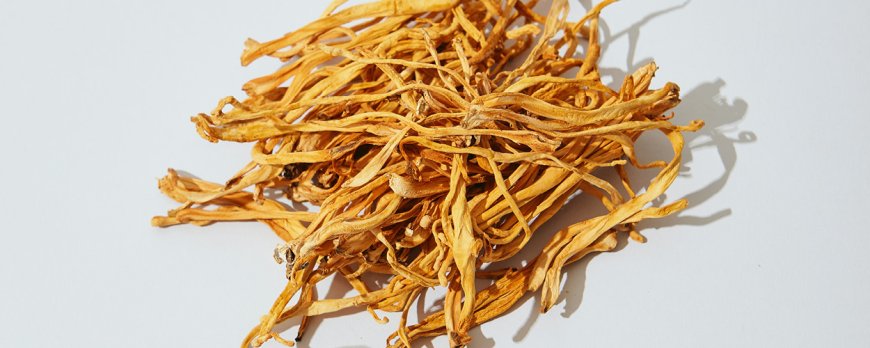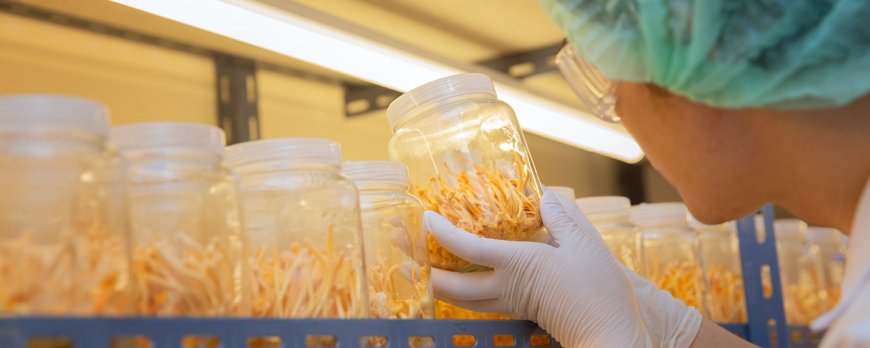Can cordyceps protect the kidneys?
Explore the answer to 'Can cordyceps protect the kidneys?' and uncover the potential health benefits of this powerful fungus. Dive into wellness insights now.

Can Cordyceps Protect the Kidneys?
Cordyceps sinensis, a traditional Chinese medicine, has been studied for its potential to protect the kidneys in people with chronic kidney disease (CKD). Several studies have shown that Cordyceps preparations can decrease serum creatinine, increase creatinine clearance, and reduce proteinuria in individuals with CKD. However, the quality of evidence is low, and more research is needed to make definitive conclusions. Cordyceps has anti-inflammatory and antioxidant effects, which may contribute to its potential protective effects on the kidneys. It also has the ability to alleviate CKD-associated complications and improve renal function. Overall, while there is promise for Cordyceps as an adjuvant therapy for CKD, conclusive evidence is currently lacking.
Key Takeaways:
- Cordyceps sinensis has been studied for its potential to protect the kidneys in people with chronic kidney disease.
- Cordyceps preparations have shown to decrease serum creatinine and reduce proteinuria in individuals with CKD.
- The quality of evidence for the benefits of Cordyceps on kidney health is currently low.
- Cordyceps has anti-inflammatory and antioxidant effects, which may contribute to its potential protective effects on the kidneys.
- Further research is needed to draw definitive conclusions on the effectiveness of Cordyceps for kidney protection in CKD.
Understanding Chronic Kidney Disease (CKD)
Chronic kidney disease (CKD) is a condition that affects the functioning of the kidneys and requires effective interventions for kidney protection. It is characterized by the gradual loss of kidney function over time, leading to various complications. CKD can be caused by underlying health conditions such as diabetes, high blood pressure, and genetic predispositions. It is essential to address CKD promptly to prevent further kidney damage and maintain overall well-being.
Individuals with CKD often experience symptoms like fatigue, swelling in the legs and ankles, changes in urination frequency, and increased blood pressure. Early detection and management of CKD are crucial for preserving kidney function and preventing the progression of the disease.
To address the need for effective treatments for kidney protection in CKD, researchers have studied the potential benefits of Cordyceps sinensis. Cordyceps preparations have shown promising results in reducing serum creatinine levels, increasing creatinine clearance, and reducing proteinuria in individuals with CKD. These effects may be attributed to the anti-inflammatory and antioxidant properties of Cordyceps, which have been shown to aid in kidney health.
While the findings are encouraging, it is important to note that the quality of evidence is still limited, and more research is needed to establish definitive conclusions. Despite this, Cordyceps shows promise as an adjuvant therapy for CKD, offering potential benefits for kidney health when used in conjunction with standard treatments. However, it is always advisable to consult a healthcare professional before incorporating any new treatment into your healthcare regimen.

The Potential of Cordyceps for Kidney Health
Cordyceps shows promise in supporting kidney function and protecting against kidney damage by improving renal health. This traditional Chinese medicine has attracted attention for its potential benefits in individuals with chronic kidney disease (CKD). Several studies have found that Cordyceps preparations can reduce proteinuria, increase creatinine clearance, and decrease serum creatinine levels in individuals with CKD.
The anti-inflammatory and antioxidant effects of Cordyceps may contribute to its potential protective effects on the kidneys. These properties can help reduce inflammation and oxidative stress, which are common contributors to kidney damage. By alleviating CKD-associated complications and improving renal function, Cordyceps may offer a natural and holistic approach to kidney health.
- Cordyceps preparations have been shown to decrease proteinuria, a common symptom of kidney disease.
- Studies have indicated that Cordyceps can increase creatinine clearance, which reflects improved kidney function.
- Cordyceps has been found to decrease serum creatinine levels, indicating reduced kidney damage.
While the existing evidence is promising, it is important to note that more research is needed to establish the effectiveness of Cordyceps in protecting and improving kidney health. Further studies are required to determine the optimal dosage, treatment duration, and potential interactions with other medications. Consulting a healthcare professional is advised before considering Cordyceps as an adjuvant therapy for CKD.
The Role of Cordyceps in Reducing Proteinuria
Cordyceps has been found to reduce proteinuria and play a potential role in preventing kidney disease. Proteinuria, the presence of excess protein in the urine, is a common symptom of chronic kidney disease (CKD). Studies have shown that Cordyceps preparations can help decrease proteinuria and improve kidney function in individuals with CKD.
One of the ways Cordyceps may reduce proteinuria is through its anti-inflammatory properties. Inflammation in the kidneys can lead to damage and impair their ability to filter waste products from the bloodstream. Cordyceps has been found to have anti-inflammatory effects, which may help alleviate kidney inflammation and reduce protein leakage into the urine.
In addition to its anti-inflammatory effects, Cordyceps also has antioxidant properties. Oxidative stress, caused by an imbalance between free radicals and antioxidants in the body, can contribute to kidney damage. Cordyceps' antioxidant effects may help neutralize free radicals and protect the kidneys from oxidative damage.
Furthermore, Cordyceps has been shown to improve renal function in individuals with CKD. Renal function refers to the kidneys' ability to filter waste products and maintain fluid and electrolyte balance in the body. By improving renal function, Cordyceps may help slow down the progression of kidney disease and prevent further complications.
List of Potential Benefits of Cordyceps for Renal Health:
- Reduces proteinuria and protein leakage into the urine
- Has anti-inflammatory effects that alleviate kidney inflammation
- Exhibits antioxidant properties, protecting the kidneys from oxidative damage
- Improves renal function, aiding in waste filtration and fluid balance
While these findings suggest that Cordyceps could be a promising adjuvant therapy for kidney disease, it's important to note that the quality of evidence is still limited. More research is needed to fully understand the mechanisms of action and determine the optimal dosage and duration of treatment. Consulting a healthcare professional before considering Cordyceps supplementation is advised to ensure it is safe and appropriate for individual circumstances.
Cordyceps as an Adjuvant Therapy for CKD
Cordyceps supplements and extracts have shown promise as adjuvant therapies for chronic kidney disease, offering potential benefits for kidney health. These natural remedies derived from the Cordyceps sinensis mushroom have been studied extensively for their impact on kidney function.
Research has indicated that Cordyceps preparations have the ability to decrease serum creatinine levels and increase creatinine clearance in individuals with CKD. Additionally, they have been found to reduce proteinuria, a common symptom of kidney disease. These findings suggest that Cordyceps may have a protective effect on the kidneys and help prevent further damage.
One of the reasons why Cordyceps supplements and extracts are believed to be beneficial for kidney health is their anti-inflammatory and antioxidant effects. These properties help to reduce inflammation and oxidative stress in the kidneys, potentially improving their overall function. Cordyceps has also been shown to alleviate complications associated with CKD and improve renal function.
Using Cordyceps for Kidney Protection
- Consider adding Cordyceps supplements or extracts as part of an overall treatment plan for chronic kidney disease.
- Consult with a healthcare professional before starting any new treatment regimen.
- Follow the recommended dosage and usage instructions provided by the manufacturer.
- Monitor kidney function regularly and discuss any changes or concerns with your healthcare provider.
- Continue to follow a balanced diet and lifestyle habits that promote kidney health, such as staying hydrated and avoiding excessive salt and processed foods.
While there is encouraging evidence supporting the potential benefits of Cordyceps as an adjuvant therapy for CKD, it is important to note that conclusive evidence is currently lacking. Further research is needed to fully understand the extent of Cordyceps' impact on kidney health and its role in the management of chronic kidney disease.

Anti-inflammatory and Antioxidant Effects of Cordyceps
Cordyceps exhibits anti-inflammatory and antioxidant effects, which are believed to contribute to its ability to support kidney health and potentially prevent kidney disease. Inflammation and oxidative stress play key roles in the progression of chronic kidney disease, causing damage to the kidneys over time. Cordyceps has been shown to reduce the levels of pro-inflammatory markers and increase the activity of antioxidant enzymes, which help to counteract these harmful processes.
By reducing inflammation, cordyceps may help protect the kidneys from further damage and support their overall function. Studies have demonstrated that cordyceps can decrease markers of inflammation in individuals with chronic kidney disease, leading to improvements in kidney function. Additionally, the antioxidant properties of cordyceps help to neutralize harmful free radicals and reduce oxidative stress, which is known to contribute to kidney damage.
Benefits of Cordyceps for Kidney Health:
- Reduces inflammation in the kidneys
- Increases antioxidant activity
- Protects against oxidative stress
- Improves kidney function
- Supports overall kidney health
While the anti-inflammatory and antioxidant effects of cordyceps are promising, more research is needed to fully understand its mechanisms of action and to determine the optimal dosage and duration of treatment. It is important to consult with a healthcare professional before incorporating cordyceps or any other supplement into your kidney health regimen. They can provide guidance based on your individual circumstances and help you make informed decisions regarding your kidney health.
Cordyceps for Alleviating CKD-associated Complications
Cordyceps has been shown to alleviate complications associated with chronic kidney disease, improving renal health and supporting kidney function. This natural supplement has been studied for its potential benefits in individuals with CKD, offering a potential adjuvant therapy alongside conventional treatments. Here are some key points to consider:
- Reducing Proteinuria: Proteinuria, the presence of excess protein in urine, is a common symptom of kidney disease. Cordyceps preparations have been found to decrease proteinuria in individuals with CKD, potentially indicating a protective effect on the kidneys.
- Anti-inflammatory and Antioxidant Effects: Cordyceps has demonstrated anti-inflammatory and antioxidant properties, which may contribute to its potential protective effects on the kidneys. These properties can help reduce inflammation and oxidative stress, both of which are associated with kidney damage.
- Improving Renal Function: Studies have shown that Cordyceps preparations can improve renal function by decreasing serum creatinine levels and increasing creatinine clearance. This suggests that Cordyceps may help enhance the overall functioning of the kidneys.
- Alleviating Complications: Chronic kidney disease can lead to various complications, such as anemia and bone disorders. Cordyceps has been explored for its potential to alleviate these complications, improving overall renal health and supporting kidney function.
While the evidence supporting the use of Cordyceps for kidney health is promising, it is important to note that more high-quality research is needed to draw definitive conclusions. Additionally, it is always recommended to consult a healthcare professional before starting any new treatment, especially for individuals with chronic kidney disease.
Overall, Cordyceps shows potential as an adjuvant therapy for chronic kidney disease, but conclusive evidence is currently lacking. Future studies may provide more insights into the specific benefits and mechanisms of action of Cordyceps for kidney health.
Current Evidence and Research Needs
While there is promising evidence for the potential benefits of cordyceps on kidney health, more research is needed to establish definitive conclusions. Cordyceps sinensis, a traditional Chinese medicine, has been studied for its ability to protect the kidneys in individuals with chronic kidney disease (CKD). Studies have shown that Cordyceps preparations can decrease serum creatinine, increase creatinine clearance, and reduce proteinuria, which are all indicators of improved kidney function in CKD patients.
The key findings from existing research on the impact of cordyceps on kidney health include:
- Decreased serum creatinine levels
- Increased creatinine clearance
- Reduced proteinuria
- Anti-inflammatory and antioxidant effects
- Alleviation of CKD-associated complications
These findings suggest that cordyceps may have a positive influence on kidney function and could potentially be used as an adjuvant therapy for CKD. However, it is important to note that the quality of evidence is currently low, and more rigorous research is needed to draw definitive conclusions.
Areas that require further investigation include:
- The optimal dosage and duration of cordyceps supplementation for kidney health
- The long-term effects of cordyceps on kidney function and disease progression
- The potential interactions and safety considerations of cordyceps with other medications
- The specific mechanisms by which cordyceps exerts its protective effects on the kidneys
By addressing these research gaps, scientists can gain a better understanding of the potential benefits and risks of cordyceps on kidney health. This knowledge will guide healthcare professionals in making informed recommendations for individuals with CKD who are considering cordyceps supplementation as part of their treatment plan.

Potential Risks and Considerations
It is important to consider potential risks and consult a healthcare professional before using cordyceps for kidney health, particularly if you have existing kidney disease. While cordyceps shows promise as an adjuvant therapy for chronic kidney disease (CKD), it is crucial to understand any possible adverse effects or interactions with other medications.
1. Allergies: Some individuals may have an allergic reaction to cordyceps. Symptoms could include rash, itching, swelling, or difficulty breathing. If you have a known allergy to fungi or mushrooms, it is advisable to avoid cordyceps supplements.
2. Drug Interactions: Cordyceps may interact with certain medications, such as immunosuppressants or blood thinners. It is essential to inform your healthcare professional about any medications you are currently taking to evaluate potential interactions.
3. Potential Side Effects: Although cordyceps is generally well-tolerated, some individuals may experience mild gastrointestinal symptoms, such as diarrhea or stomach discomfort. If these side effects persist or worsen, it is important to consult your healthcare provider.
4. Quality and Safety: When choosing cordyceps supplements, ensure that you purchase them from reputable sources to guarantee quality and safety. Look for products that have been independently tested for purity and potency.
Consulting a healthcare professional before starting any new treatment, including cordyceps supplementation, is crucial to ensure it aligns with your specific health needs and circumstances. They can provide personalized recommendations and guidance based on your medical history and current health status. Remember, conclusive evidence regarding the effects of cordyceps on kidney health is currently limited, and further research is needed to establish its efficacy and safety.
Conclusion
Cordyceps exhibits potential in supporting kidney health; however, conclusive evidence is currently lacking to establish its effectiveness as a standalone treatment for chronic kidney disease. Cordyceps sinensis, a traditional Chinese medicine, has been the subject of several studies exploring its potential protective effects on the kidneys in individuals with chronic kidney disease (CKD). These studies have shown that Cordyceps preparations can decrease serum creatinine levels, increase creatinine clearance, and reduce proteinuria in CKD patients.
Although these findings are promising, it is important to note that the quality of evidence is currently low. More research is needed to draw definitive conclusions about the effectiveness of Cordyceps in treating CKD. One of the potential mechanisms of action of Cordyceps is its anti-inflammatory and antioxidant effects, which may contribute to its protective effects on the kidneys.
In addition to reducing proteinuria and improving kidney function, Cordyceps has also shown the ability to alleviate complications associated with CKD. However, it is crucial to consult with a healthcare professional before starting any new treatment, including Cordyceps supplementation, as individual responses may vary and potential risks and considerations need to be evaluated.
In summary, while there is promise for Cordyceps as an adjuvant therapy for CKD, conclusive evidence is currently lacking. Further research is needed to establish the optimal dosage, duration of treatment, and potential long-term effects of Cordyceps on kidney health. Individuals with CKD should work closely with their healthcare team to determine the most appropriate treatment plan for their specific condition.

































































































































